The Windows Registry is a database, located in the system32 folder, that stores all system configurations and settings. Over a period of time, you do end up installing and uninstalling several software on your computer. many times, you tweak or change system settings, and change them back – all this can result in broken registry keys, orphaned keys, and invalid entries in the Registry. Moreover, when you remove such invalid registry entries using a Registry Cleaner, empty spaces are left behind in the Registry and its hives.
Free Registry Defragmenter
Registry Defragmenters help in removing such bloated registry hive & empty spaces and compacting the registry. We have already seen whether Registry defragmentation is useful or not. If you do decide to use a Registry Defragmenter to defrag Windows Registry, here are a few free ones that you may want to check out.
1] Auslogics Registry Defrag
The registry is very much like hard disk drives. Whenever you start working on your computer, programs access the registry very often. Due to the addition and deletion of entries, the registry may develop invalid entries and get bloated and fragmented over time. To an extent, a fragmented registry could reduce computer performance. Auslogics Registry Defrag can defragment and compact the Windows registry in less than a minute. The program will scan the registry, remove slack spaces and also reduce the size of the registry. The program also offers to delete your junk files. It appears to be the only freeware that offers a nice UI and shows you the fragmentation of the registry. It also automatically creates a system restore point first before starting the operation, which is a good thing in my opinion.
I have used this registry defragmentation freeware, on occasion and found it to be pretty safe.
While installing this freeware, do remember to uncheck the options to make Ask your default search provider and Ask.com your home page.
2] Free Registry Defrag
Free Registry Defrag will help in compacting and optimizing your registry by removing gaps and wasted space, in order to improve the system performance. I have used this registry defragger too on occasions and found it to be safe.
3] Registrar Registry Manager Lite
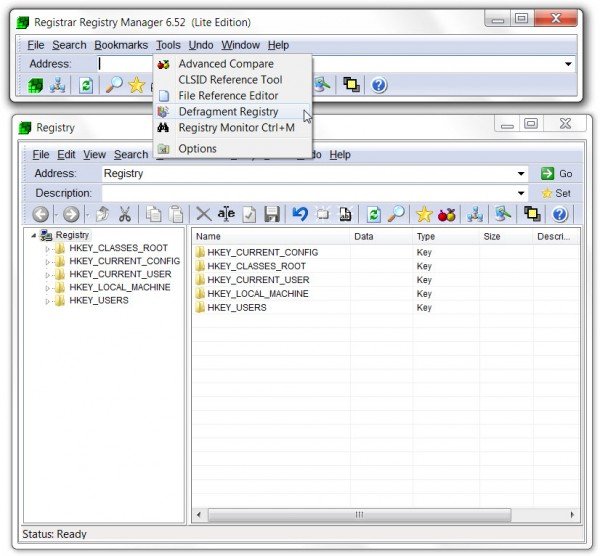
Registrar Registry Manager Lite is a free tool for system administrators and power users who need to work with the Windows Registry frequently. This tool offers a complete and safe solution for working with and maintaining the registry on your own desktop as well as remote computers on your network. It also includes a registry defragger, along with many other tools to manage the registry.
4] Registry Compressor
Like other programs, Registry Compressor too does not remove or add anything to the registry. This program rebuilds the registry to new files, as a result of which all extra space is gone and the registry is smaller.
5] WinUtilities Registry Defrag
WinUtilities Registry Defrag will check how fragmented your registry is. Before the analysis starts, you will be informed to close all other applications. You should do so because any changes made to the registry after Registry Defrag has been run are lost after the reboot. It is available on CNET.
6] Eusing Free Registry Defrag
Eusing Free Registry Defrag can defragment and compact the Windows Registry.. It will scan through the registry to remove any slack space, reducing the registry size and ultimately the amount of RAM the registry takes up, Eusing Free Registry Defrag is a free registry defragmentation software that optimizes registry by removing gaps, fragments and wasted space in Windows registry files.
7] NTREGOPT
NTREGOPT is a registry optimization software which was popular during the Windows XP days. It will only work correctly if you turn off User Account Control and run it with proper administrative privileges.
8] PageDefrag
PageDefrag from Sysinternals will defrag Paging & Registry files. Standard defragmentation programs can neither show you how fragmented your paging files or Registry hives are, nor defragment them. Paging and Registry file fragmentation can be one of the leading causes of performance degradation related to file fragmentation in a system. It uses advanced techniques to provide you what commercial defragmenters cannot and that is the ability for you to see how fragmented your paging files and Registry hives are, and to defragment them.
PageDefrag has not been updated since 2006 and therefore may not work on newer versions of Windows.
Apart from the above-mentioned registry defragmenters, many software like Registry Recycler Portable – as also some free Windows Optimizers include a Registry Defragmentation software as a part of their suite.
Do let us know if you use Registry Defragmenters or would like to recommend any particular one.
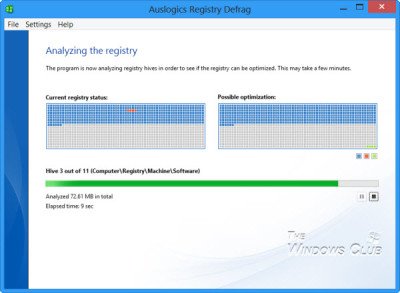
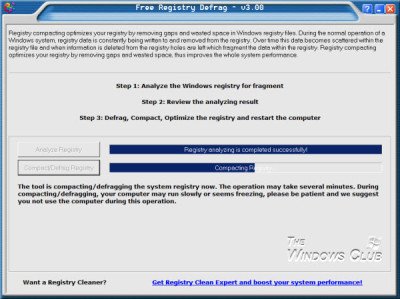
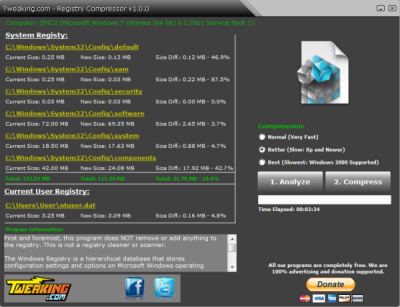
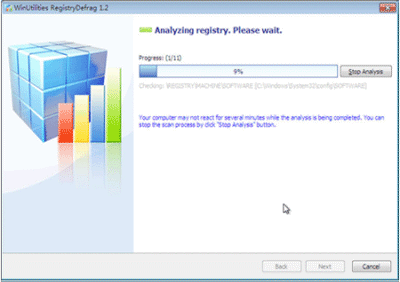
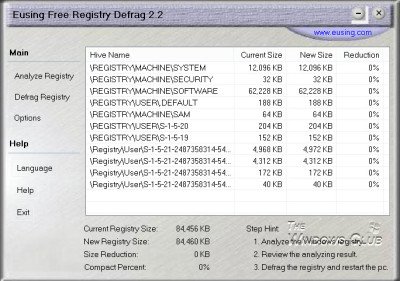

Nice articale Anand, while I don’t use registry utilities much any more
one I did use and found quite good was Registry Life By ChemTable.
It clean’s and repair’s the registry, backup’s and then defragment’s if
needed and it’s free. Here’s the home page if you want a look.
Link: http://www.chemtable.com/RegistryLife.htm
I just use CCleaner and MAYBE Defragler. Windows defrags itself automatically starting in Windows 7 SP2, it automatically turns off defrag on any drive it sees as being an SSD as defrag is completely unnecessary on SSD’s, it properly identifies 99% or SSD’s, and it does just as fine a job as any of these.
Plus there are so many BS paid “registry optimizers” “registry defraggers” (Lol) and “system optimizers” that either don’t actually do anything to warrant paying for them or worse, actually do harm to your computer and/or are bundled with actual malware, that I steer clear of all that crap. I see iObit software being advertised on this website. That automatically is a red flag to me, because you can’t get much more BS than iObit : /